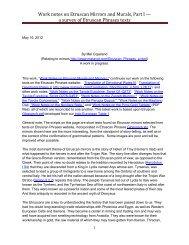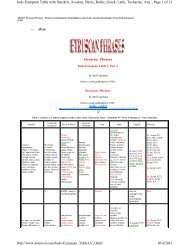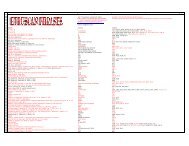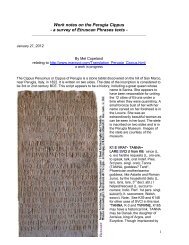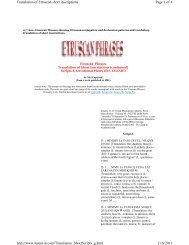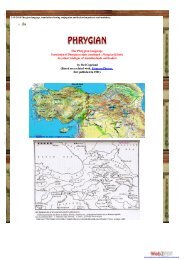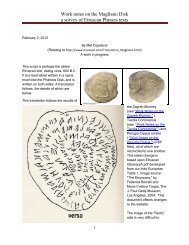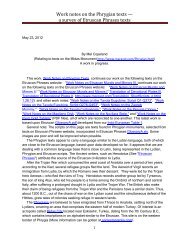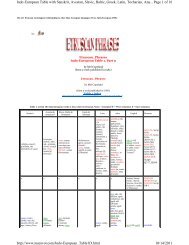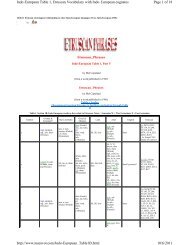Indo-European Table 1, Etruscan Vocabulary ... - maravot.com
Indo-European Table 1, Etruscan Vocabulary ... - maravot.com
Indo-European Table 1, Etruscan Vocabulary ... - maravot.com
Create successful ePaper yourself
Turn your PDF publications into a flip-book with our unique Google optimized e-Paper software.
* All ETP numbers from http://etp.classics.umass.edu/<br />
(1) Based upon the suffix, "ia" used in the Divine_Mirror.html, for people, Tinia, (god Tini) Elenia (Helen of Troy) and Acaia, it is<br />
probable that the suffix relates to personal names, perhaps as a genetive ending.<br />
(2) Ati is the word for father in Turkish.<br />
(3) According to the Iliad, when listing the allies of the Trojans who came to help them in the war against the Achaiains (Greeks), the<br />
Carians, who lived along the southeastern coast of Turkey, are listed as being of "barbarian speech." Note, then, the similarity of<br />
Carian speech, in this case involving the word eight, to English.<br />
(4) While this should be obvious to our readers by now, tad-cu is used in south Wales and taid in north Wales. The<br />
Bretons, who use tad-kozh, came from south Wales, and tad-kozh is probably the older form.<br />
(5) Script AO, an inscription on the lintel of a tomb in Orvieto, says, "AMAR LE ANA TE," "to love there Ana your"<br />
(to love your Ana there). See Miscellaneous_Short_Scripts.html. The name, Ana, appears in several scripts.<br />
(6) Scripts AR, NC and SM, Miscellaneous_Short_Scripts.html, reflect nearly identical scenes on cinerary urns.<br />
These scenes appear to be of Polynices and Eteocles, the classic tale of the sons of Oedipus, king of Thebes. The two sons had<br />
agreed to rule Thebes jointly after their father's disgrace, but Eteocles did not honor the bargain and banished his brother. This<br />
quarrel, the result of Oedipus' curse on his sons, resulted in the war of the Seven Against Thebes and the death of the brothers at<br />
each other's hands. Eteocles was succeeded on the throne by his son Laodamas, or by Creon who was perhaps acting as regent for the<br />
boy. While the themes of the urns are the same, they were not made from the same mold, since there<br />
is a change in costumes for the four characters in each scene (two women who appear to be<br />
prostitutes), the attacker and the attacked. Click on the thumbnail to view the two scripts: It is<br />
interesting that the character in Script AR is depicted with a missing hand. Was he a thief? Yet, the<br />
inscription on his urn seems to call him "a friend royal." He looks like he was a good looking young man.<br />
(7) The use of AL is curious, and it certainly cannot be "to the, at the" as in Italian, since <strong>Etruscan</strong> does not use the<br />
word, 'the." In the Hermene Script, HT, it is the last word in an inscription on a tile that appears to be identifying<br />
the place of Hermes. "alius" seems to be the appropriate word in the context of the usage, "vastness of Hermenes<br />
god to the rebirth of another." In the <strong>Etruscan</strong> banquet scenes, etc., there is an offering of an egg. This appears in<br />
the scene of Uni Suckling Hercules, where she is giving Hercules, whom she tried to destroy, life (Uni, as Juno<br />
and Hera, were the goddesses of childbirth). The egg is a symbol of life, rebirth, to Christians and other faiths. In<br />
the Miscellaneous_Short_Scripts_a.html we can see how important the egg is in the afterlife. It is part of the<br />
banquet offerings, along with the drink which may be like Soma, the drink of Indra and the gods. Hermes is a god<br />
who carried the departed soul to the abode of the afterlife. He also is identified with the invention of writing, the<br />
bringer of knowledge, and would be so as the messenger of the gods.<br />
(8) An appelation in the Tavola Eugubine is ATIIERIV, with declensions, "Atigerius." This <strong>com</strong>pares to the Rig<br />
Veda's appelation concerning its founding fathers or patriarchs. We have three expressions hinting at the source<br />
of this term. The first is that referring to the Adityas, the gods who reign in the highest heavens, with Aditi<br />
meaning "eternity or eternal" (Rig Veda Book 1, XIV.3). According to Professor Müller's translation of the Rig Veda<br />
1.230, 'Aditi, an ancient god or goddess, is in reality the earliest name invented to express the Infinite; not the<br />
Infinite as the result of a long process of abstract reasoning, but the visible Infinite, th endless expanse beyond<br />
the earth, beyond the clouds, beyond the sky.' One of the famous early sages or reciters (Rsis) of the Rig Veda<br />
was Atri (Rig Veda Book 1, XLV.3). Coincidentally, the sons of Atreus , Agamemnon (the king of Mycenae) and<br />
Menelaüs, they and their sons being called Atreidae, are called to mind, since they engaged the sons of Atys<br />
(King Priam and his allies) in the Trojan war. The other, frequently mentioned ancient family in the Rig Veda is<br />
the Angirases (Rig Veda Book 1, I.6). It may be that the <strong>Etruscan</strong> memory together with that of the Illiad and the<br />
Rig veda, recall two ancient <strong>Indo</strong>-<strong>European</strong> ancestors of a tribe preceeding the Greeks, <strong>Etruscan</strong>s and Aryans of<br />
the Rig Veda. My source on the Rig Veda is Ralph T. H. Griffith, "Sacred Writings, Hinduism: The Rig Veda,"<br />
Quality Paperback Book Club, New York, 1992 and Motilal Banarsidass Publishers PVT. LTD. I highly re<strong>com</strong>mend<br />
it, particularly with regard to Griffith's footnotes. A copy of the Rig Veda and other Sanskrit literature may be read<br />
at: http://www.sacred-texts.<strong>com</strong>/hin/.<br />
Not to confuse things, but Ati is also a name for "king" in the "Hymn to Osiris Un-Nefer," "Egyptian Book of the<br />
Dead, Book 1." Early Greek mythology recalls that one of the first kings of Argos was Danaüs, from Egypt. He and<br />
his brother Aegyptus were twin sons of Belus, who ruled the vast territory of Egypt. The brothers each had fifty<br />
children by many wives. Danaüs had only daughters, while Aegyptus had only sons. Belus gave Libya to Danaüs<br />
and Arabia to Aegyptus. Mixed in the episode are the Melampodes who occupied a portion of the lands and was<br />
conquered by Aegyptus. Subsequently Aegyptus named the lands after himself. Then apparently Aegyptus had his<br />
eyes on Danaüus' inheritance, and fearing his brother's plot to kill him Danaüs made an arrangement with the<br />
goddess Athena to sail with his daughters to Argos. There are several versions of the story, as to how the Argives<br />
claim inheritance from Danaüs, but the versions <strong>com</strong>e down to the fact that only one of the 50 daughters<br />
produced progeny to inherit the Argive throne. It seems that Danaüs, suspecting a plot to overthrow him,<br />
persuaded his daughters to kill their husbands. Only one daughter, the eldest named Hypermnestra, refused to kill<br />
her husband, Lynceus, because he had respected her virginity. Lynceus inherited the throne of Argos from<br />
Danaüs.<br />
The Trojan war was launched from the area, Argolis, on the Gulf of Argolis which included the cities of Argos,<br />
Tyrns, Mycennae, etc. The people in the Illiad who invaded Troy are referred to by the names of "Argives" and<br />
"Danaäns" and the terms were often applied to the Greeks as a whole. After the period of the Trojan war the area<br />
came under attack, as evidenced by the Mycennaean tablets called "Linear B" and with the destruction of their<br />
citadels the Mycennaean (Danaän) dominance of the Mediterranean came to an end (circa. 1180 B.C.). The<br />
<strong>Etruscan</strong>s, as sons of Tyrsenus, son of Atys, may have inherited the "Mycennaean" legacy – carrying on the art<br />
and technology – continuing it from their new base in Italy. The name, Argos, beyond being the name of one of<br />
the towns, became the symbol of the area en<strong>com</strong>passing the citadels of the Argolis, and one of King<br />
Agamemnon's titles, as king of Mycenae, was "king of Argos," the supreme <strong>com</strong>mander over all the forces from<br />
the Gulf of Argolis. The story of Danaüs and his daughters is related by several sources. Aeschylus, in his play,<br />
The Suppliants, recalls the daughters of Danaüs supplicating King Pelasgus for asylum from Aegyptus. To read<br />
the play click on The Suppliants.<br />
(9) I was curious at the expression in the Rig Veda regarding battling against a hundred "iron castles." A specific<br />
reference is in the Rig Veda, Book IV.27.1, " A hundred iron fortresses confined me.." which <strong>com</strong>pares to Book<br />
II.14.6, "...who as thunder demolished Sambara's hundred ancient castles.." Not being able to imagine "iron<br />
castles" erected in the Bronze Age (~1,500 B.C., when the Rig Veda was supposedly created) I consulted<br />
Capeller's online Sanskrit Dictionary (http://www.uni-koeln.de/phil-fak/indologie/tamil/cap_search.html) and it<br />
revealed that "ayas" is the word for iron, metal, but the word no doubt referred to bronze before iron was widely<br />
used. I can visualize the authors of the Rig Veda gazing upon walled cities whose gates or edifices might have<br />
been faced with bronze or metal sheeting. See also Book 1, Hymn LVI.3, "the iron one," i.e., the thunderbolt.<br />
(10) The Rig Veda addresses its [most] ancient, priestly family as the Angirases. See Book 1. LI.3. This name is<br />
remarkebly close to the Atiierie.<br />
(11) We used the following current websites in <strong>com</strong>piling translations (some sites used from 2004-2006 are no<br />
longer online) :<br />
Sanskrit: http://www.sanskrit-lexicon.uni-koeln.de/mwquery/<br />
(12) Update: September 2011> reconciling <strong>Indo</strong>-<strong>European</strong> <strong>Table</strong> to <strong>Etruscan</strong>_GlossaryA.xls.



